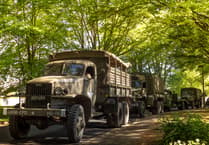On February 24, 2022, Russia launched military action in Ukraine, with forces crossing into the country from Belarus in the north, Russia in the east and Crimea in the south.
And when it began, Putin said it was a ‘special military operation’ to protect the people of the Donbas and to ‘demilitarise and denazify’ Ukraine, and denied that Russia planned to occupy Ukrainian territory.
The reality of the past 12 months is, of course, very different.
Russian forces have been conducting a full-scale assault on its neighbour, and in October 2022 Russia signed annexation treaties recognising Donetsk, Luhansk, Kherson and Zaporizhzhia as part of the Russian Federation.
As commentators have said this week, the attack on Ukraine represents the biggest threat to European stability since the Second World War.
The broad alliance of NATO and like-minded nations is more conscious than ever that nothing can be taken for granted, and are united in purpose to protect the democratic values and freedoms that Putin continues to threaten.
The shift in Germany’s defence posture and position on trade with Russia alongside, for example, Japan’s change in stance on defence in the shadow of China’s looming force, shows just how profoundly this war has changed the outlook of nations across the world.
And that includes a lack of opposition to Russia’s action from many other countries, especially across the ‘global south’, presenting a significant diplomatic challenge for European and North American leaders.
There is little doubt Putin’s plan has failed to play out as he hoped.
Months of entrenched combat, thousands of soldiers and civilians dead, isolation from the international community, and large-scale sanctions hurting the Russian economy.
The introduction of full or partial bans of Russian gas, coal and oil have been central to those sanctions, but the impact on the global supply and price of energy has been felt by millions of households here in the UK and right across the world.
There is a renewed focus on the security of energy supply, and the UK remains committed to reducing its reliance on Russian supplies, and has now banned gas imports from the start of 2023.
This is not just about Russia’s aggression and Ukraine’s resistance. It is a war of significance for us all, and one that will not be without cost for the rest of the world – but the cost of conceding to a bully would be far greater in the end for us all.
Cost to the rest of the world, yes, but nothing compared to the suffering of Ukrainians. Support from other nations, yes, but nothing compared to the fortitude of the Ukrainians.
Around eight million refugees have left Ukraine and an additional 5.9 million are displaced within the country. Poland has recorded 9.3 million border crossings from Ukraine since the start of the war, and is host to 1.5 million refugees.
Around 160,000 Ukrainians have arrived here in the UK, including here in East Hampshire, and there is still great work being done by local organisations such as the Rural Refugee Network as well as local schools to help welcome and support them.
It was inspiring to hear President Zelensky address the two houses of parliament in Westminster Hall. He talked about individuals making heroic efforts, but he himself shows the difference an individual can make, leading his country with unwavering determination and resilience.
No-one thought a year ago that Ukraine could have held out this long, let alone made counter gains.
Putin underestimated the resistance of the Ukrainian people, and the unity and resolve of NATO and western allies. He overestimated the ability of his own armed forces, and support for the war at home. It is of paramount importance that Ukraine prevails, and we stand united in that cause.





Comments
This article has no comments yet. Be the first to leave a comment.